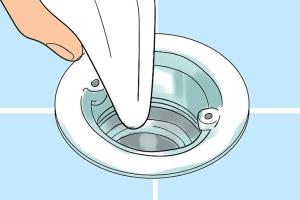Mastering Shower Drain Caulking: Your Ultimate Guide for a Leak-Free Bathroom

-
Quick Links:
- Introduction
- Why Caulking is Important
- Types of Caulks for Shower Drains
- Tools and Materials Needed
- Step-by-Step Guide to Caulking a Shower Drain
- Common Mistakes to Avoid
- Tips for Success
- Case Studies and Expert Insights
- FAQs
Introduction
Caulking a shower drain is a vital maintenance task that many homeowners overlook. A well-caulked shower drain not only prevents leaks but also contributes to the longevity of your bathroom fixtures. In this comprehensive guide, you will learn everything you need to know about caulking a shower drain, from why it’s important to the materials you’ll need and the steps to follow.
Why Caulking is Important
Caulking around your shower drain serves several essential purposes:
- Leak Prevention: Proper caulking seals gaps and prevents water from seeping into unwanted areas, potentially causing damage.
- Mold and Mildew Control: Moisture can lead to mold growth; caulking helps keep water contained.
- Enhanced Aesthetics: A clean and well-sealed shower drain looks more appealing and can improve the overall look of your bathroom.
Types of Caulks for Shower Drains
When selecting a caulk for your shower drain, you’ll find several types available. Here are the most common:
- Silicone Caulk: Flexible and waterproof, ideal for wet areas.
- Acrylic Caulk: Easier to clean up with water and paintable but less flexible.
- Polyurethane Caulk: Extremely durable and adheres well to various surfaces.
Tools and Materials Needed
Before you begin caulking your shower drain, gather the following tools and materials:
- Caulk (silicone or polyurethane recommended)
- Caulk gun
- Utility knife
- Masking tape
- Rag or paper towels
- Cleaning solution (vinegar or a commercial cleaner)
Step-by-Step Guide to Caulking a Shower Drain
Follow these steps for an effective caulking process:
Step 1: Clean the Area
Ensure the surface around the shower drain is clean and dry. Use a cleaning solution to remove any soap scum, mold, or debris.
Step 2: Prepare the Caulking Gun
Cut the tip of the caulk tube at a 45-degree angle and puncture the inner seal. Load the tube into the caulk gun.
Step 3: Apply Masking Tape
Apply masking tape along the edges of the drain to create clean lines for the caulk.
Step 4: Apply the Caulk
Hold the caulk gun at a 45-degree angle and apply a consistent bead of caulk around the drain. Make sure to fill any gaps thoroughly.
Step 5: Smooth the Caulk
Use your finger or a caulking tool to smooth the caulk, ensuring it adheres well and looks neat.
Step 6: Remove the Masking Tape
Carefully pull away the masking tape while the caulk is still wet to avoid smudging.
Step 7: Allow to Cure
Let the caulk cure according to the manufacturer’s instructions, usually 24 hours, before using the shower.
Common Mistakes to Avoid
- Not cleaning the surface adequately before applying caulk.
- Applying caulk in wet conditions.
- Using the wrong type of caulk for the job.
- Not allowing enough curing time before use.
Tips for Success
- Practice applying caulk on a scrap piece of material before tackling the drain.
- Keep a damp rag handy to clean up any messes immediately.
- Consider using a color-matched caulk for a seamless look.
Case Studies and Expert Insights
According to a study by the Home Improvement Research Institute, properly caulked shower drains can reduce water leakage by up to 80%. Expert plumber Mike Rowe suggests checking caulk integrity every six months as part of regular bathroom maintenance.
In a case study of a homeowner who neglected to caulk their shower drain, it was found that water damage led to costly repairs amounting to thousands of dollars. Regular maintenance could have prevented this situation.
FAQs
1. How often should I re-caulking my shower drain?
It is recommended to check your caulking every six months and replace it if you notice wear or damage.
2. Can I use regular caulk for a shower drain?
No, it’s best to use a caulk specifically designed for wet areas, such as silicone or polyurethane caulk.
3. What is the best way to remove old caulk?
Use a utility knife to carefully cut away the old caulk and a caulk remover tool for stubborn residues.
4. Is caulking a shower drain a DIY task?
Yes, caulking a shower drain can be easily done as a DIY project with the right tools and materials.
5. How do I know if my caulk is still good?
Check for cracks, discoloration, or peeling. If you see any of these signs, it’s time to replace the caulk.
6. Can I paint over caulk?
Acrylic caulk can be painted over, but silicone caulk typically cannot be painted.
7. What should I do if water is still leaking after caulking?
If you continue to experience leaks, check for other plumbing issues or consider hiring a professional plumber.
8. How long does caulk take to dry?
Most caulks require at least 24 hours to cure fully, but you should check the manufacturer’s instructions for specifics.
9. Can I caulk over old caulk?
It’s best to remove old caulk before applying new caulk to ensure a proper seal.
10. What type of caulk is best for preventing mold?
Silicone caulk with mold inhibitors is the best choice for preventing mold growth in wet areas.
Random Reads
- Remove write protection sd card
- Remove windows old
- Manual reset wifi adapter windows
- Master mcdonalds video game
- Open windows explorer
- Open youtube links android app
- Mastering farming techniques in 7 days to die
- Mastering excel zip files
- Installing windows on ubuntu
- Installing skyrim script extender